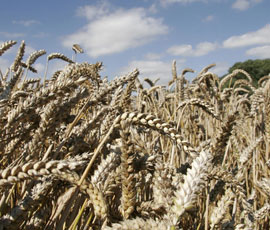GM wheat trial begins amid high security

Britain’s first field trial of genetically modified wheat has started under 24-hour security amid fears of an attack by anti-GM groups.
Costing almost £1m, Rothamsted Research began a field trial of a wheat crop, which has been modified to repel aphids, last week.
The laboratory work and trial will cost £800,000 and £120,000 will be spent on security. Funding is being provided by the Biotechnology and Biological Sciences Research Council (BBSRC) – but there is no commercial funding.
The modified wheat was planted into eight 6m x 6m trial plots at Rothamsted’s research centre in Hertfordshire, on Thursday 22 March. It is the third GM trial on-going in the UK, which is conducting two GM potato trials.
Scientists at Rothamsted have modified the wheat cultivar Cadenza so it produces an aphid alarm pheromone with the aim of making wheat production less reliant on pesticides.
The plant produces a non-toxic odour, (E) beta-farnesene (EBF), a naturally occurring chemical found in peppermint plants, which it releases to repel aphids and attract their native predators, parasitic wasps (Braconidae).
The wasps lay their eggs inside the aphids and the larvae develop to kill them.
Scientists say the odour smells like “greasy green Granny Smith apples”, but although it is acutely sensitive to aphids, it is undetectable to humans.
Laboratory work has shown positive results at repelling a range of wheat aphid pests, including the three main UK winter aphids, Sitobion avenae (grain aphid), Rhopalosiphium padi (bird cherry oat aphid), and Metopolophium dirhodum (rose-grain aphid).
Speaking at the press briefing in London on Wednesday (28 March), John Pickett, head of chemical ecology at Rothamsted, said: “We are providing a totally new way of controlling pests that doesn’t really rely on toxic modes of action – and it’s a UK first.”
Prof Pickett said he hoped that the trials would benefit the farming community and produce a “saleable” product in the future.
“We have shown that the virus-transmitting aphids and the summer aphids are repelled by the lines of wheat expressing this gene,” said Prof Pickett, describing thelaboratory work..
“In the laboratory, we can see serious fear on the part of the aphids. We can also see increased foraging by the parasitoids. This has all increased dramatically and statistically significant.”
The fields trials are viewed as the “acid test”. They will run for this summer and be replicated next spring to give a consistency of results.
“We have got the genes into an elite winter variety, Cadenza, which can be grown as a spring variety or an autumn-sown variety,” said Prof Pickett, explaining the trials.
“We have chosen to use it as a spring variety. We will be monitoring the crop this summer as it develops. We will be monitoring the aphids, the parasitic wasps, everything that could possibly be there.
“They are small plots, eight 6m x 6m plots, separated by various buffers. There’s a big fence around it and a ditch. We have got to keep out vertebrates – pigeons, rats and mice and hedgehogs and so on, because of the rules.
“Although the genetics of this experiment are incredibly benign, we have to keep this experiment totally contained. We also want to keep out unauthorised human beings.”
DEFRA granted Rothamsted approval to conduct research into the GM wheat last September. But campaign group GM Freeze said the trial was a “big mistake and premature”.
Rothamsted has since undertaken meetings with anti-GM lobby groups, and the public to explain the reasons behind the trial, which have been positive, Prof Pickett added.
“I think there’s a common interest in improving the sustainability of agricultural production and of using natural processes better,” he said.
“We do feel that there is a better view of this from the public at large. But there are some individuals who are very strongly against this trial and they may seek to disrupt it by direct action.”
Prof Pickett said the trial was part of the industry’s long-term strategy for increased and sustainable food production and delivery of insect control through the seed.
“Companies are very interested and they are keeping a watching brief as they always do in all research,” Prof Pickett added.
“We have all been wined and dined very heavily by academic groups in the USA wanting to see what new things we have got in mind for GM.
“This is of global, great significance and it could be that we generate very good intellectual property for commercial development in the interests of the UK and European agriculture and business.
“That’s the long term plan, but this trial has no commercial connection whatsoever.”
Scientists at Rothamsted are also working with colleagues in Brazil – and China soon – who are trialling (E) beta-farnesene (EBF) to repel aphids in cotton and soya crops.
Wheat is the most important UK crop with an annual value of around £1.2bn.
Aphids are the main pests of wheat and they cause significant damage to crops and spread plant diseases, which without the use of insecticides, would cost the UK up to £120m a year, research has shown.

